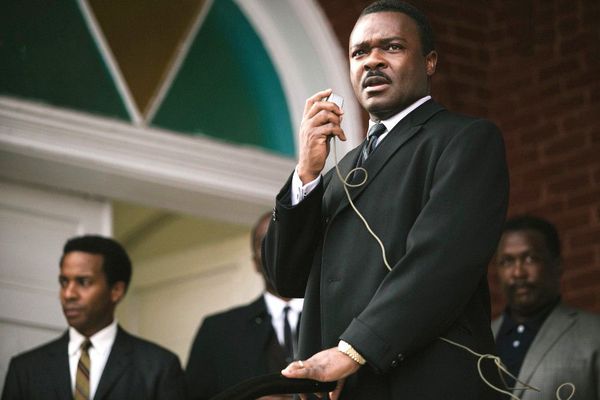 |
| David Oyelowo as Dr. Martin Luther King Jr. in Ava DuVernay's impassioned Selma |
Author, journalist, and fellow First Time Fest juror Gay Talese hosted an Alabama Night in New York screening at Paramount Pictures of Ava DuVernay's Oscar nominated film Selma, a forceful and passionate look at a turning point in Civil Rights history. David Oyelowo in a spectacular performance as Martin Luther King Jr., Carmen Ejogo as his wife Coretta, Tom Wilkinson as President Lyndon B. Johnson, Tim Roth as Alabama Governor George Wallace, Keith Stanfield as Jimmie Lee Jackson, with Oprah Winfrey, Common, Cuba Gooding Jr., Tessa Thompson, Dylan Baker, Giovanni Ribisi, Martin Sheen and Alessandro Nivola are part of the remarkable ensemble.
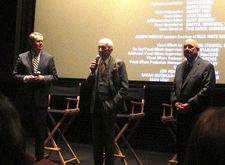 |
| Gay Talese with Mark Nelson and Culpepper Clark: "In 1965, I was one of the reporters covering this story…" Photo: Anne-Katrin Titze |
Glory, performed by John Legend and Common with music and lyrics by John Stephens and Lonnie Lynn, received an Oscar nomination for Best Original Song.
Earlier in the day, Gay let me know how personal Selma was for him. "During the 1965 Civil Rights confrontations, I was a [New York] Times reporter covering the situation; and during the 'Bloody Sunday' clamour in Selma, on March 7, 1965, on the Edmund Pettus Bridge (which is shown brutally in the film), I was actually standing there on the bridge witnessing and writing about the whole episode."
As a graduate of the University of Alabama, Gay Talese was particularly curious about the reactions from the audience, consisting mostly of fellow alumni of all ages and a few honorary Alabamians.
Selma starts with King, staring, skeptically, right at us. Only that he is looking into the mirror checking his ascot - and he is not happy with it. The year is 1964. The place Oslo, Norway. And the occasion, getting dressed for the ceremony to accept the Nobel Peace Prize. The horrific events of "Bloody Sunday" in Selma, Alabama, are yet to come. Selma, unlike many movies marking a historical watershed, is immensely convincing when it goes for the grand gesture.
_225.jpg) |
| Martin Luther King Jr. with Coretta Scott King (Carmen Ejogo) in Oslo, 1964. |
Oyelowo's delivery of King's speeches and the moment of truth between him and his wife Coretta (Ejogo) are consequential and emotionally upfront. Wilkinson as President Johnson and Tim Roth as Governor Wallace build up to their breathtaking chat on how to be remembered. It is the way DuVernay approaches the ruthlessness of the segregationists - with an unflinching, unsentimental and never exploitative stance - that makes Selma such an outstanding achievement.
Paramount Pictures' Vice President of National Publicity, Monica Sheldon, who was involved with Selma since pre-production, hosted the event and spoke a few words of introduction.
Monica Sheldon: I know that Ava DuVernay is excited that you are all here as well. This movie has sparked a lot of really great conversations and we are looking forward to another great one tonight.
Following the screening, Dean of Communications at the University of Alabama, Mark Nelson, and Emeritus Dean of Communications, Culpepper Clark, joined Gay Talese on stage to discuss the events depicted in the film.
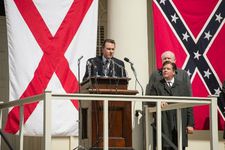 |
| Tim Roth as Alabama Governor George Wallace |
Gay Talese: I speak as a graduate of the University of Alabama with a lot of pride. I am the son of an Italian immigrant and I went to the University of Alabama in 1949 and completed in 1953 my bachelor's degree. As a reporter, I joined The New York Times a year after graduation. In 1965, I was one of the reporters covering this story, but the story wasn't over when the story ceased to be the headline. I got to go to Alabama constantly through the years. I speak to you as an intimate who has also remained an outsider… I'm 83 now and I do see the great changes in Alabama.
As a frequent visitor to the State of Alabama and to Selma as well, when I go out with friends of mine in Selma, and I have many there, we go to restaurants, we see blacks and whites dining together in a very comfortable way, that I as a 50 year plus resident of New York do not see. I see in New York daytime egalitarianism, people working together in newspapers and department stores and restaurants and having all kinds of jobs, high-paying jobs and low-paying jobs. Come nightfall in the great City of New York, there is this distance that pervades the city. People live in neighborhoods such as I, where since 1955, when I first moved into my neighborhood in the East 60s, my block hasn't changed in terms of integration.
_225.jpg) |
| King with President Lyndon B. Johnson (Tom Wilkinson) |
Culpepper Clark: What you brought, Gay, was a special lens when you went anywhere as a reporter… I know where I was on Bloody Sunday, a senior in college in Atlanta. I was walking down to my fraternity house that evening to watch the ABC Sunday night movie. And you know what broke in on that movie. The movie was Judgement At Nuremberg and the break in was Bloody Sunday. Think of that juxtaposition! What you see in the movie [Selma], they try to make it like breaking news. It wouldn't have broken that way, in that day. It had to get to Montgomery, it had to be processed and that's the reason why it was that night before the rest of the nation saw it.
I spent my life as a historian of Civil Rights, so I know where all the little liberties are taken with the historical account. Jimmie Lee Jackson was shot in Marion, not in Selma. He died in Selma. James Reeb did not die in the streets in Selma, he died nine days later at the University Hospital in Birmingham. Viola Liuzzo was shot by a carload of Klansmen. There were four of them, one of them was an FBI informant, Gary Thomas Rowe. And when [Governor George] Wallace was doing his mischief at the University of Alabama in 1963, Gary Thomas Rowe was down there stirring up a whole lot of trouble in that area.
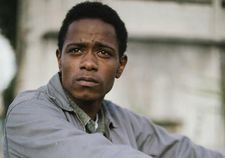 |
| Keith Stanfield as Jimmie Lee Jackson |
What does that say? It doesn't say anything other than in docudrama you're going to have to take some liberties to get at what Kenneth Burke called "the epitomising image." And those liberties were taken throughout. Can you imagine doing a history, a docudrama, of Martin Luther King and not having access to the texts of his speeches, which DuVernay did not have? What they did, they captured really the essence, did they not, in this film?
We were given some more insight on what it was like to cover the events in Selma.
Gay Talese: I was one of three reporters from The New York Times. One was Roy Reed who covered the political side of the story. And I covered, what they used to call, and I hate to use the word "colour", but they call it "colour". That was not the main headline, but the people story, the sideline story. I first arrived on the day before, on March 6th. I was there on the Edmund Pettus Bridge on Sunday night. There wasn't expected to be a climactic occasion at all. It was very much a surprise.
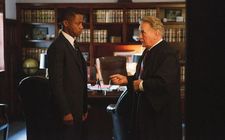 |
| Cuba Gooding Jr. as Fred Gray with Martin Sheen as Judge Frank Johnson |
When I saw this film - this is the second time - at a screening a few weeks ago, I was prepared not to like this film. I thought, having seen the mayhem and the madness of Bloody Sunday and also I stayed there for the next 16, 17 days and went with the other reporters and the great gatherings to Montgomery, I didn't believe that Hollywood would do justice to this. I felt that this is a magnificent film. Cully [Culpepper] talks about certain historical quarrels - of course that is not debatable. But I felt the spirit of what I saw as a reporter and wrote about is truly represented in this film.
As a reporter covering Selma, not covering the Johnson administration or the politics behind the scene, I spent time with Sheriff Clark, I spent time with George Wallace. In fact, I interviewed George Wallace in 1962 when he came to New York. He was staying at the Pierre Hotel on Fifth Avenue and 61st Street. I knew George Wallace because his press aide Bill Jones was a student in my journalism class. I had an interview with Wallace at The Pierre Hotel in 1962, several years before Bloody Sunday.
 and James Bevel (Common)_225.jpg) |
| Diane Nash (Tessa Thompson) and James Bevel (Common) |
And Wallace said to me, "Listen, Mr. Talese, there is more segregation on this block than in my little town." I didn't quarrel with him and I made allusion today in my opening remarks to that. We should not be too confident in New York about our progress. I did say to these Paramount people that I thought it was a very accurate representation of the street scenes and the chaos and the characters.
Clark concluded with a word on Robert Zemeckis's Forrest Gump.
Culpepper Clark: Forrest Gump, as you know, is our most famous alumnus. When Paramount was going to do the movie, they gained access to the [University of Alabama] president's office and I was an executive assistant at that time. We were cooperating and then I got a copy of the screenplay. It has that scene at the schoolhouse door [referring to Governor Wallace standing in the door of the University of Alabama to prevent two black students from entering on June 11, 1963.] in there which does not exist in [Winston Groom's] book. When Paramount was coming into Alabama, they knew they wanted to start there because of how dramatic that moment was for the movement.
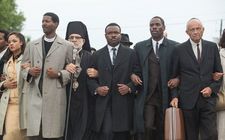 |
| The second Selma march |
I read the [Forrest Gump] screenplay and it had such unfortunate caricatures of our students that I recommended to the president we do not cooperate. That's why I wrote a letter and we sent it out to Hollywood. Winston Groom, the author, gets called out to talk to the executive producer who says "how dare they not cooperate?" And Winston Groom said, "Look, Buddy, the University of Alabama is bigger than Paramount."
Selma opened in the UK on February 6 and is in theaters in the US since December 25. The Oscars will be announced on February 22.





















